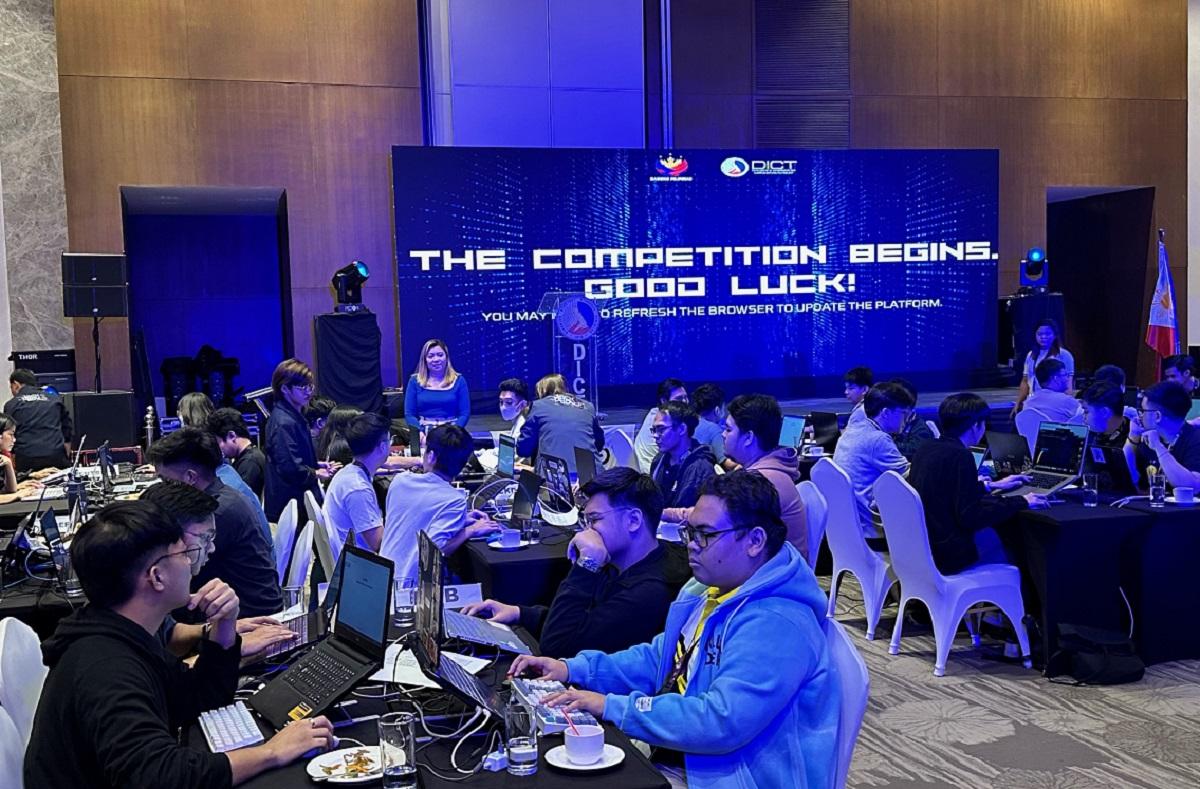DICT competition aims to discover new breed of cybersecurity experts

Teams from various universities in the National Capital Region (NCR) on Friday took part in the annual Hack4Gov competition of the Department of Information and Communications Technology (DICT).
The competition was started in 2019 and will be held in other regions as well.
“We have been inviting schools, mga academicians for them to, parang contest ito, capture the flag. This involves yung mga simulations ng hacking, among others,” Director Carlos Reyes of the DICT Cybersecurity Bureau said in an ambush interview.
(We have been inviting schools and academicians to join this capture-the-flag contest, which involves simulations of hacking, among others.)
Reyes said teams will be given scenarios such as cyberattacks and they will need to remediate the situation.
“Kung sino yung pinakaunang naka-remediate (the first ones who can remediate), they’ll be considered the winner,” Reyes said.
“This is a learning experience para sa lahat. Ito ay isang like, parang they compete with themselves, by themselves. Tapos yung mga learning experience nila doon sa kanilang mga competitor, aangat yung kanilang competency,” he added.
(This is a learning experience for all. It's like they're competing with themselves. Their learning experience from their competitor will improve their competency.)
Cyber experts needed
While the DICT builds the competency of the students as future cybersecurity experts, it is also building up a pool of experts that will help the country in the future.
“Alam naman nating yung ating (we all know our) pool of experts in cybersecurity is quite declining so we want to build a pool of cybersecurity professionals to serve government, private organizations, hopefully here in the Philipines. That’s one of the intention of this Hack4Gov, for them to build their competency, for them to be hired as professional cybersecurity experts,” Reyes said.
According to Reyes, the DICT Cybersecurity Bureau has only 60 personnel and the department needs 200 more cybersecurity experts. Even if this is realized, he said this number is still behind other Asian countries such as Singapore, which has 800 cybersecurity experts, and Myanmar, which has 400.
“Actually, hindi lang sa Pilipinas. Anywhere in the world, kailangang-kailangan yung cybersecurity experts (Not only in the Philippines, but anywhere in the world there is a need for cybersecurity experts),” Reyes said, pointing out that salary plays a big role in enticing cybersecurity experts to work in the government and even the private sector.
Cyber-attacks
But despite the lack of cybersecurity experts, Reyes said the DICT has thwarted numerous cyberattacks.
“It does not mean na lahat yon is successful doon sa kanilang attacks and breaches. Most of them are remediated. On the onset pa lang ng pag-attack nila, we remediate it already. So yung mga attacks na yon, probably 10% success. At the same time, yung mga nag-successful attack, we still do actions for it to be remediated as well,” he emphasized.
(It does not mean that all the attacks and breaches were successful. Most of them are remediated, even at the onset of their attacks. Those attacks are probably 10% succeessful. At the same time, for successful attacks, we still do actions for it to be remediated as well.)
As of now, the DICT said only 30 government offices out of more than 300 are connected to the department’s realtime monitoring. Its target is for all government offices to be connected to it by 2028.
Through Hack4Gov, Reyes said he is hoping that students will choose a career in cybersecurity.
“We will be enticing them to get their careers specifically majoring in cybersecurity. That’s the real essence of it. Hopefully we could get this realized na, alam mo yon, na parang meron na tayong spare na we can spend abroad pero we could have more na mare-retain dito sa Pilipinas to address our needs as well,” he said.
Learning experience
Denzel Mana-ay, a student of Computer Science at the Asia Pacific College, is competing for the first time with three of his schoolmates.
“Ito yung sinasabi namin na parang before internship, before work, kailangang ma-immerse kami somewhere. So as future cybersecurity professional, this is a great field or great pool of people na makakatulong,” Mana-ay told GMA Integrated News.
(This is what we're talking about, that before our internship, before work, we need to be immersed somewhere. So as future cybersecurity professional, this is a great field or great pool of people to meet that can help us.)
“I’m happy to say na sa sobrang dami ng tao rito na hindi ko ine-expect, there’s a bright future in cybersecurity here in the Philippines and also around the world. I believe na titibay ang ating cybersecurity,” Mana-ay added.
(I'm happy to say that I didn't expect this many people. there’s a bright future in cybersecurity here in the Philippines and also around the world. I believe na titibay ang ating cybersecurity,” Mana-ay added.
In a video message, DICT Sec Ivan John Uy called on the participants to collaborate with the government to combat cyber threats.
“In the realm of cybersecurity, lines between hero and villain can often blur. It is within this gray area that ethical hacking emerges as an essential tool in safeguarding digital infrastructure in ensuring data integrity,” Uy said.
“Harness your skills for good rather than evil. With hacking tools and techniques becoming increasingly available, the temptation to exploit vulnerabilities for personal gain and mischief is strong. Yet the choice between becoming a protector and a destructor in the digital realm is clear. Choose the path of integrity and responsibility. Second, collaborate with the government,” he added. —KBK, GMA Integrated News




